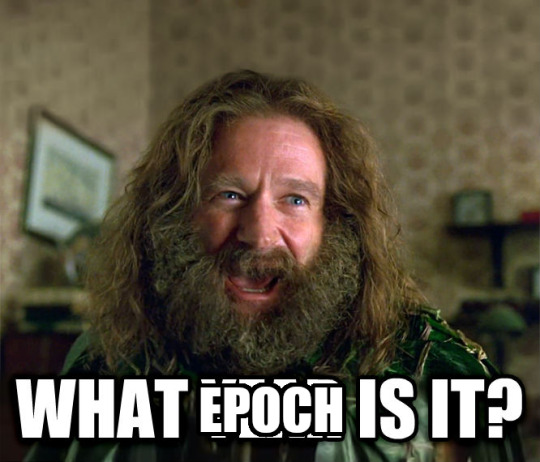#anthropocene epoch
Text
Jan A. Zalasiewicz, Scott L. Wing and the Anthropocene Working Group writing for The Smithsonian:
"What Myths About the Anthropocene Get Wrong"
"It is hard to accept that we as a society have gained so much power to change the Earth and have thought so little about how to use that power. Scientific knowledge can transform our perspectives (think of heliocentrism and evolution)—so it’s not surprising that the Anthropocene is hard to accept."
The authors address what they view as ten common myths, or counter-talking points, that are thrown-up at the idea that homo sapiens sapiens has made a massive difference in the climate of Earth. From geologic data differentiating our current day from the recently (geologically speaking) deceased Holocene epoch, the Working Group states that they can reasonably point to 1952 as the best year to count from, the year when things were notably different.
Among the myths:
No 2. "The Anthropocene is too short to be a geological epoch—just one human lifetime -- The Anthropocene’s duration is short, true—so far...[but] the Anthropocene represents far more significant and enduring change to the planet than does the Holocene."
No 4. "Anthropocene strata are “minimal” or “negligible" -- That’s a very geological objection—but it’s wrong. Humans have, since the mid-20th century, been prodigious reshapers of the landscape and movers of rock and sediment...To define a time period formally, geologists must identify distinctive signals in sediments or rocks that can be correlated around the globe, and the presence of such markers is ubiquitous. The geology is real."
No 6. "Other animals have affected the environment and caused geological change, so there’s nothing special about the Anthropocene -- Other animals have indeed changed the environment, but that can help rather than hinder the recognition of geological time intervals. For instance, the rise of mobile, muscular animals that could burrow through sediment serves as the basis for defining the Cambrian Period. But none of those previous changes has swept across all environments on the planet so quickly—or been triggered by an animal conscious of the changes it was making [emphasis added]. This consciousness, we note, is yet to be effectively translated into action to ward off the worst consequences of these changes. Too many still pursue economic and industrial development without considering the long-term cost to planetary health."
Full story
0 notes
Text
375 notes
·
View notes
Text

2 notes
·
View notes
Photo
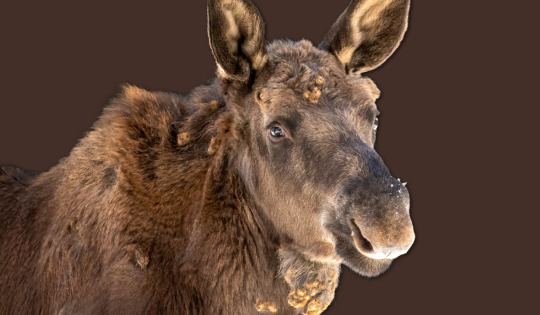
The Top 5 Longreads of the Week
In this edition, we're featuring stories on:
* Student protesters in their own words.
* Dance as freedom from disability.
* Wealth disparity in Big Sky, Montana.
* The Anthropocene as earth’s final epoch.
* Birthing a Cabbage Patch Doll.
Learn why our editors are recommending these stories.
201 notes
·
View notes
Text
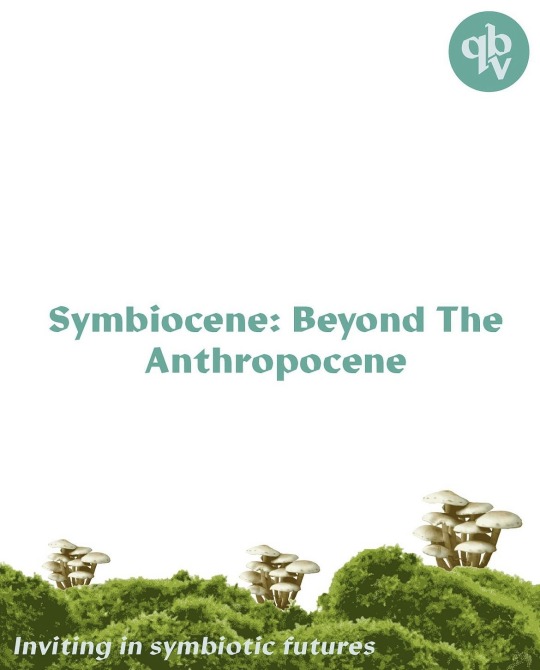
New blog post!
Have you ever heard of the term “Anthropocene”? The term defines this current period of time in which human activity is altering the Earth’s systems. Typically, the periods of time used to define Earth’s history (like epochs and ages) are based on rock layers and the fossils contained within them. While Anthropocene isn’t officially recognized by the International Union of Geological Sciences, this term has still gained support.
What this term tells us: this is a distinct period in time, defined by increasing environmental destabilization from human activity (specifically, destabilization from the extractive and exploitative systems, enforced by an absurdly wealthy ownership class).
What it doesn’t tell us: what’s next?
link
instagram
#queerbrownvegan#sustainability#climate change#environmentalism#social justice#environment#climate crisis#environmental justice#activism#intersectional environmentalism#symbiocene#anthropocene#hopepunk#solarpunk#climate anxiety
72 notes
·
View notes
Text
After the Anthropocene mass extinction Africa’s movement made it break off Eurasia and let it develop its own fauna without competition from the neighbouring landmass.
Other than the many carnivorans, like Sankara’s cat or the broad-faced dogs, many other critters inhabit the continent, both herbivores and omnivorous generalists.
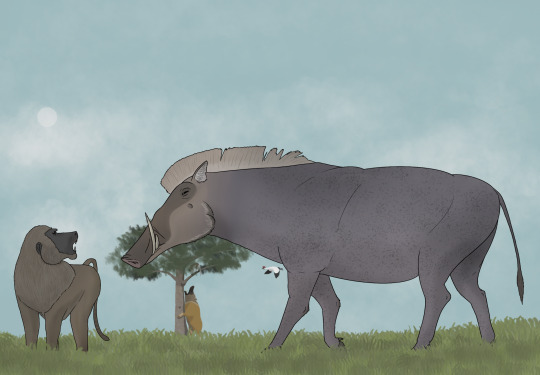

Quite a common sight in the Anectyocene savannah are surely the Perdvarks (Hippochoerus longipes), long legged cursorial warthogs that roam the flat landscape in droves of sows and piglets or bachelor males, or alone, in the case of older boars. Another swine, the bushpig, took a different route, keeping their omnivorous diet and growing bulkier, letting a lineage of big omnivores evolve, containing the biggest predator in the African continent, the Gouebeervark (Hyodus inexpetans), capable of taking down, albeit rarely and with difficulty, the enormous hyraxes that inhabit the grasslands and forests.
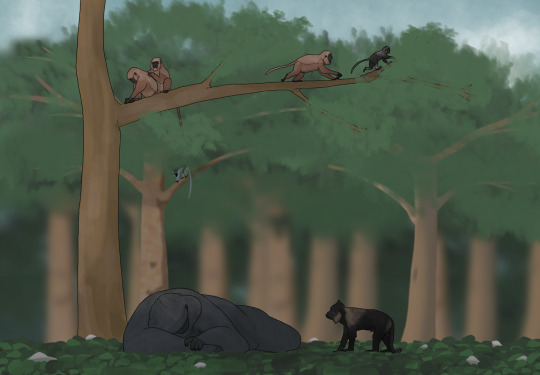
A quite successful group are definitely the monkeys, whose diversity didn’t even drop too much, losing “only” the great apes, most baboons, geladas, mandrills, drills and some smaller ones. They’ll prosper in this epoch, with their numbers skyrocketing both in the rainforest and the savannah, and with many adapting new forms, such as some blue monkeys converging on a gorilla or ground sloth bodyplan.

The most successful group across the continent, tho, are definitely the antelopes, descended from the smaller species such as dik-diks and grysboks. They are found anywhere in Africa, in every ecosystem, where they’ve replaced all of their bigger extinct relatives, becoming graviportal herbivores, high browsers and cursorial grazers, and now dominate the landscape as their cousins did before them.
#spec evo#spec bio#speculative evolution#speculative biology#worldbuilding#artwork#digital art#epigene period#future earth
24 notes
·
View notes
Text


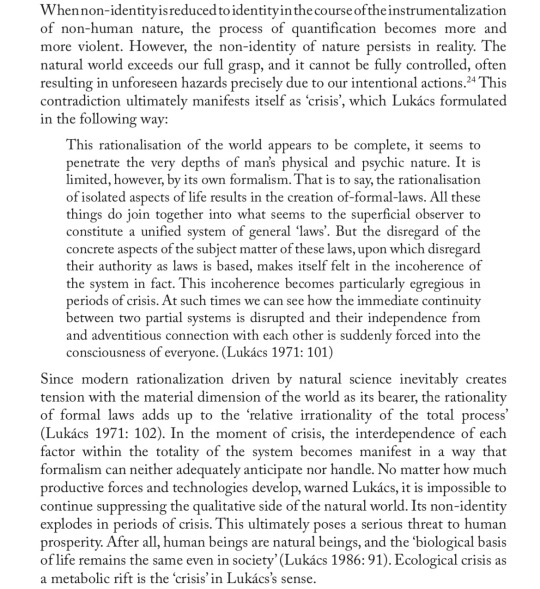
—Kohei Saito, Marx in the Anthropocene: Toward the Idea of Degrowth Communism
See “solastalgia”, a term coined by an Australian philosopher to “describe the existential melancholy induced by environmental change.”
Apparently geologists will soon vote on whether to accept the claim that we are in the geological epoch known as the Anthropocene.
“The AWG [Anthropocene Working Group] will present a proposal to make the Anthropocene official to the Subcommission on Quaternary Stratigraphy later this summer. If the subcommission’s members agree with a 60% majority, the proposal will then pass on to the International Commission on Stratigraphy, which will also have to vote and agree with a 60% majority for the proposal to move onward for ratification.” What will be the outcome of the vote?
#political philosophy#philosophy#kohei saito#marx#marxism#communism#anthropocene#capitalocene#ecology#environment#solastalgia#capitalism#political economy#theory#metabolic rift#Lukács
61 notes
·
View notes
Text
Nooo. The proposal to officially declare Earth to be in the Anthropocene Epoch as evidenced by sediment samples from a rare meromictic lake in my area has been voted down. It feels wrong and somehow unscientific that something so huge and important hinged on the judgement of only 16 people.
#I'm biased towards the idea that we have left the holocene and entered the anthropocene#but even if they are right... 16 people? thats all who gets a say? about the official state of the entire planet?
13 notes
·
View notes
Note
as a mammal paleontologist who does biostratigraphy with very small, informal chunks of time in the paleocene, it's super funny to me to see people saying there should be fewer subdivisions of time. all i do is divide things up more lmaoo. but i do think it's definitely a mix of recency bias, mammal bias, and human bias that the epochs of the cenozoic are used so commonly. like all the other periods have more subdivisions of time, but the ones in the cenozoic are the only ones that ever show up on geologic timelines. anyways, i agree that the anthropocene is a bit ridiculous since humans have been influencing the planet and causing extinctions since the start of the holocene
like I get why we need smaller divisions, but those need to be spread out across the history of life, not just concentrated in the cenozoic! it's not really about having smaller divisions but just how clearly those divisions are biased towards recent times.
I'm glad the vast majority of paleontologists I've met agree that the anthropocene is just ridiculous given, in fifty million years, everything from the past 2 million will all be a single destructive blur
47 notes
·
View notes
Text
20 notes
·
View notes
Text
What do you think? Should this proposal have been rejected? Or is using the term "Anthropocene" a good way of classifying the current geological epoch?
#science#science communication#scicomm#stem#science education#biology#science blog#geology#anthropocene
4 notes
·
View notes
Note
87 for Agnes
83 for will
79 for zahir
73 for Jina
60 for Joaquin (technically not p&d, so sue me (pls don't))
56 for enid
like all charcuterie boards- i do appreciate a good spread 😂*cracks knuckles* let's do this
56: what are some things you find endearing in people?
enid: wit and a strong sense of personal style; she hates when people are wishy washy/indecisive- so someone who displays conviction in any way (even if she disagrees) would earn her respect
60: do you like poetry? what are some of your faves?
joaquin: he has an appreciation for it- but wouldn't consider himself a poet. his father kept a book of poems and would often read some to joaquin as a child. the one that stuck with him the most was 'caminante, no hay camino' [traveler, there is no road] by antonio machado
73: what are some of your worst habits?
jina: she forgets to close cupboards/drawers after opening them, which silently drove agnes crazy while they lived together as roommates in college
79: what's one of the cutest things someone has ever done for you?
zahir: his friends from high school/college all filmed personalized video messages as a graduation present since his ceremony was delayed, then eventually canceled due to covid.
83: what's some of your favorite album art?
will: halsey's manic album art/aesthetic; the timelapsed paintings/ sketches seen throughout the lyric videos are the kinds of pieces they'd gravitate towards
87: what are some movies you think everyone should watch at least once in their lives?
agnes: 'don't look up' // 'anthropocene: the human epoch' // 'train to busan'
ask game
#tyyy🖤🖤#ascindio#playchoices#choices#park & davis#into the windverse#enid mendoza#will thomson#zahir saidi#agnes park#jina davis#laws of attraction#ask game 3
3 notes
·
View notes
Text
Blog 10: Kickstarting change for the better of the environment
Prompt: Describe your personal ethic as you develop as a nature interpreter. What beliefs do you bring? What responsibilities do you have? What approaches are most suitable for you as an individual?
Throughout this course we have been encouraged to examine what kind of interpreter we are and what we represent as an interpreter. I have not only learned a lot about the different ways I subconsciously interpret nature but also the way I rely and share this information to others. In short, I definitely feel more connected to myself as someone who interprets nature and specifically what things in nature particularly interest me. I feel like this is especially important being someone who is in Environmental Science and going on to persure a career in this field.
Being an Environmental Science student, all of my classes have looked deeply into the innerworkings of the environment from how different parts of nature function and why, to how multiple factors function to create what we know as the planet. With that said, I have also learned a lot about why conserving different aspects of the environment is important and this directly lines up with my beliefs as a person and as a nature interpreter. I think that if we as humans feel we are so ‘important’ and put our importance above the natural world to the point where we feel we can alter it however we want, then we automatically make ourselves responsible to protect and sustain it when it is faced with adversity. Sort of like a ‘you break it, you fix it’ scenario. Now, I know you’re all thinking that you’ve heard this a million times, but we are seriously running out of time and that’s something I think a lot of people don’t understand or can’t get a grasp on. I think oftentimes we forget that there are 8 billion people on earth all operating in the same manner and at the same time we are, and that many people have a significant influence on the earth. When we pursue and support conservation efforts, not only does it acknowledge the intrinsic value of other species, but also the intrinsic connection between us and our natural world. We can’t seem to get a grasp on the idea that the world’s resources are finite, so I believe looking towards conservation efforts is a first great step in the start of working with the environment rather than against it. I wanted to brush up on this blog I read regarding social science and its role in conservation that I largely agree with and I think kind of goes hand in hand with the point I’m trying to get across. The blog talks about this book called “Conservation Social Science: Understanding People, Conserving Biodiversity” and how human behaviour is a crucial part of conservation practices and solutions and is mostly ignored. They go on to explain that conservation is about changing the way that we as humans interact with the environment in our everyday lives, therefore we have to also look at aspects such as human’s relationship with the environment. Just because there is scientific evidence that there is a need to protect the earth doesn’t mean everyone understands it or believes it, that just the kind of world we live in. This blog also touches on how significant amounts of money is being put into conservation efforts but sometimes don’t succeed for the simple reason that they do not take into consideration how societies interact and influence the environment. I believe that this is definitely a huge factor but just as much as conservationists need to ultizate social sciences, society needs to be more self aware in terms of their relationships with the environment and why it is so crucial to understand the world around you as there is way more than what meets the eye. I’ve linked the short blog post below if anyone is interested!
Although there is always room to expand my environmental science knowledge, I think as someone who understands and studies the environment as well as works within the field, it is my responsibility to be the voice for nature. It is my responsibility to do my best to spread my knowledge to others in hopes to make society more aware and it is also my responsibility to keep learning about the environment as time goes on. Being a voice for nature can show others a recognition of interconnectedness between us and the environment that they may have never understood or have simply overlooked. I feel although reading books or articles about this topic is extremely important, learning through others can make learning these things a lot more fun. I’ve found that when I learn through other people I tend to remember things better and actually engage in the topic of conservation by asking questions and bouncing off knowledge. It is my responsibility to not relay information by talking at people, but talking WITH people. There is a huge difference. When you make learning interesting and are passionate about what you are presenting, it entices people to listen and hopefully continue to strengthen their knowledge. Not only is it important for me to be an advocate but also ensure that I am also making environmentally conscious choices within my everyday life and working towards a greener way of life. If I’m going to preach that way of life to others then I need to be a prime example myself! Having learned everything I have in my studies thus far, I feel a sense of responsibility to create change and do something memorable. Whether that be discovering new research or designing something that contributes to protecting our planet.
I think the approaches that are most suitable for me as an individual are getting involved or working with companies that express the same values as me, giving me the opportunity to put my mindset into action. I am striving to pursue a job with large companies working in environmental restoration and protection. I feel this would give me a great opportunity to take what I’ve learned and apply it in a real world scenario, different perspectives and voices are always needed in this kind of field. In my first year of university (approximately 4 years ago) I worked with Trent University students in releasing turtle hatchlings back into a wetland within the city of Guelph and since experiencing that, I knew that was something I wanted to keep on doing. I think in doing this kind of work not only am I putting my beliefs into action but I hope to also enspire others to want to do the same, especially younger generations. I think it is extremely important to expose these generations to scenarios such as this so that they can be consciously aware of their actions and also enspire them to potentially take a science route in their future studies. Scenarios like this can completely change what people think they know about nature and also help the younger generations get a head start on a greener way of life and influence them in an environmentally cautious way. Creating first hand experiences to others can potentially change someone’s route of life like it did mine! It can help people see what they are interested in and work towards pursuing that. There can never be too many scientists in this kind of field, more is potentially one step closer to saving our earth. With all that said, I will leave you all with this short video and remember it is never too late to do the right thing and if you put your mind to it, you are capable of great things.
youtube
6 notes
·
View notes
Text
well it's not an epoch, but it will continue to be used to describe current changes as an event.
3 notes
·
View notes
